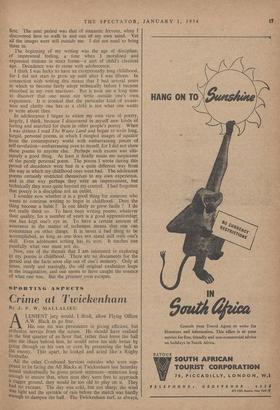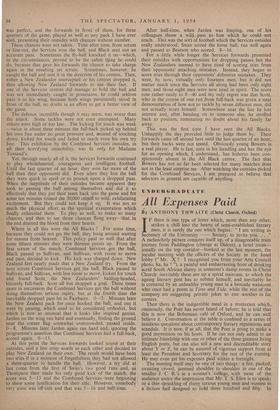was perfect, and the forwards in front of them, for
three quarters of the game, played as well as any pack I have ever , sea, presenting their outsides with chances without number.
These chances were not taken. Time after time, from scrum or line-out, the Services won the ball, and Black sent out an accurate pass. Sometimes the fly-half knocked it on—which, in the circumstances, proved to be the safest thing he could do, because that gave his forwards the chance to take charge • again in the resulting set scrum. Sometimes, however, he caught the ball and sent it in the direction of his centres. Then, either a New Zealander intercepted or his centres dropped it, thus allowing New Zealand forwards to use their feet. If one 'of the Services centres did manage to hold the ball and was not immediately caught in possession, he could seldom pass it to his wing, because both wings persistently stood in front of the ball, no doubt in an effort to get a better view of the game.
The defence, incredible though it may seem, was worse than the attack. Some tackles were not even attempted. Many others were high or too late. The kicking for touch was weak —twice in about three minutes the full-back picked up behind his own line under no great pressure and, instead of touching down, kicked for touch and failed to reach even his own try line. This exhibition by the Combined Services outsides, in all their horrifying immobility, was fit only for Madame Tussaud's.
Yet, through nearly all of it, the Services forwards continued to play wholehearted, courageous and intelligent football. Until the last quarter of an hour, they won far more of the ball than their opponents did. Even when they lost the ball ' they were quick to spoil or to pounce upon a dropped pass. When the ineptitude of their outsides became apparent they took to passing the ball among themselves and did it so effectively that they put their team back into the game and for some ten minutes roused the 30,000 crowd to wild, exhilarating excitement. But they could not keep it up,: It was not so much the physical effort as the spiritual exasperation which finally exhausted them. To play so well, to make so many chances, and then to see those chances flung away—that in the end drained the blood from their hearts.
Where in all this were the All Blacks ? For some time. because they could not get the ball, they hung around waiting for manna from heaven. This policy paid so well that after some fifteen minutes they were thirteen points up. From the first scrum of the match, Combined Services got the ball. Black passed to Sullivan, and Sullivan, with room to move and pass, decided to kick. His kick was charged down. New Zealand .feet nearly made that a New Zealand try. From the next scrum Combined Services got the ball, Black passed to Sullivan, and Sullivan, with less room to move, kicked for touch and found Scott, the New Zealanders' balding-headed, leisurely full-back. Scott all but dropped a goal. Three times more in succession the Combined Services got the ball without doing themselves serious injury, but at the fourth time the inevitable dropped pass let in Fairbairn. 0-3. Minutes later the New Zealand pack for once hooked the ball, and out it went by passing, which used to be considered orthodox, but which is now so unusual that it looks like inspired genius. Jarden on the wing ran hard and eventually, finding the ground near the corner flag somewhat overcrowded, passed' inside. 0-8. Minutes later Jarden• again rail hard and, ignoring the programme's assertion that Combined Services had a full-back, scored again. 0-13.
At this point the Services forwards looked round at their outsides, said a few crisp words to each other and decided to play New Zealand on their own. The result would have' been two tries if in a moment of forgetfulness they had not allowed a three-quarter to handle the ball. However, a try did at last come from the first of Swan's two good runs and, as Thompson then made only good kick. of- the match, the score was 5-13 and the Combined Services 'were beginning to Show' some justification- for their title. However,- somebody very soon was off-side and that was 5-16 and half-time. After half-time, when Jarden was limping, one of his colleagues threw a wild pass to him which he could not reach. This.was the sort of football which the Services outsides really understood; Swan seized the loose ball, ran well again and passed to Beatson who scored. 8-16.
For a little while longer the Services forwards presented their outsides with opportunities for dropping passes but the New Zealanders seemed to have tired of scoring tries from their opponents' attacking mistakes. Instead, they began to score tries through their opponents' defensive mistakes. They were, by now, virtually only fourteen men, but it did not matter much since the Services all along had been only eight men, and those eight men were now tired in spirit. The score rose rather easily to 8-40 and my only regret was that Scott, who in the course of one run from full-back was given a neat demonstration of how not to tackle by seven different men, did not actually score himself. Somewhere near the line he lost interest and, after handing on to someone else, he strolled back to position, ruminating no doubt about his family far away.
This was the first time I have seen the All Blacks. Unhappily the day provided little to judge them by. Their forwards came off second best until the last quarter of an hour, but their backs were not tested. Obviously young Bowers is a real player.. He is fast, sure in his handling and has the eye for an opening which, 1 understand,. has hitherto been con- spicuously absent in the 'All Black centre. The fact that Bowers has not so far been selected for many matches does not in the least surprise me. After watching the outsides picked for the Combined Services. I am prepared to believe that selectors in general are capable of anything.











































 Previous page
Previous page